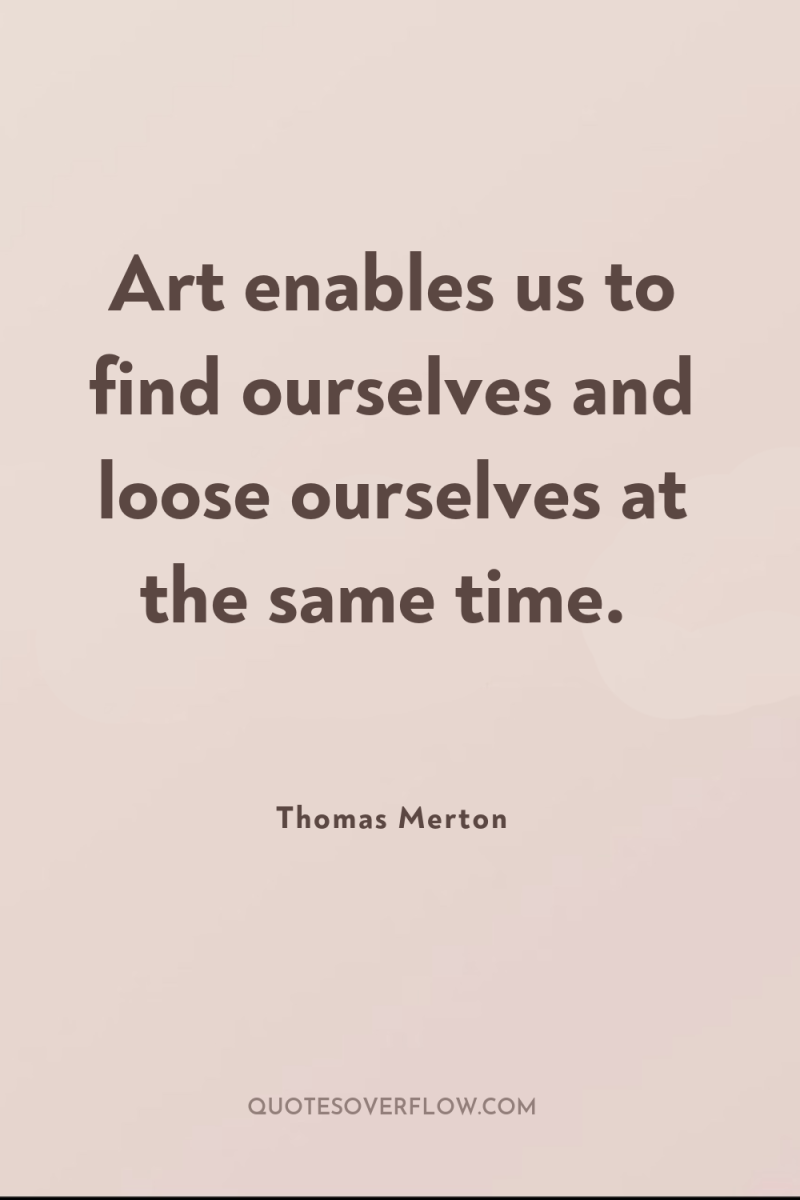1
The beginning of love is the will to let those we love be perfectly themselves, the resolution not to twist them to fit our own image. If in loving them we do not love what they are, but only their potential likeness to ourselves, then we do not love them: we only love the reflection of ourselves we find in themThomas Merton
2
Consequently, the truth of God lives in our souls more by the power of superior moral courage than by the light of an eminent intelligence. Indeed, spiritual intelligence itself depends on the fortitude and patience with which we sacrifice ourselves for the truth, as it is communicated to our lives concretely in the providential will of GodThomas Merton
3
The man who fears to be alone will never be anything but lonely, no matter how much he may surround himself with people. But the man who learns, in solitude and recollection, to be at peace with his own loneliness, and to prefer its reality to the illusion of merely natural companionship, comes to know the invisible companionship of God. Such a one is alone with God in all places, and he alone truly enjoys the companionship of other men, because he loves them in God in Whom their presence is not tiresome, and because of Whom his own love for them can never know satiety.Thomas Merton

4
True happiness is not found in any other reward than that of being united with God. If I seek some other reward besides God Himself, I may get my reward but I cannot be happy.Thomas Merton
5
Most of the world is either asleep or dead. The religious people are, for the most part, asleep. The irreligious are dead. Those who are asleep are divided into two classes, like the Virgins in the parable, waiting for the Bridegroom's coming. The wise have oil in their lamps. That is to say they are detached from themselves and from the cares of the world, and they are full of charity. They are indeed waiting for the Bridegroom, and they desire nothing else but His coming, even though they may fall asleep while waiting for Him to appear. But the others are not only asleep: they are full of other dreams and other desires. Their lamps are empty because they have burned themselves out in the wisdom of the flesh and in their own vanity. When He comes, it is too late for them to buy oil. They light their lamps only after He has gone. So they fall asleep again, with useless lamps, and when they wake up they trim them to investigate, once again, the matters of a dying world.Thomas Merton
6
There is something in the depths of our being that hungers for wholeness and finality. Because we are made for eternal life, we are made for an act that gathers up all the powers and capacities of our being and offers them simultaneously and forever to God. The blind spiritual instinct that tells us obscurely that our owns lives have a particular importance and purpose, and which urges us to find out our vocation, seeks in so doing to bring us to a decision that will dedicate our lives irrevocably to their true purpose. The man who loses this sense of his own personal destiny, and who renounces all hope of having any kind of vocation in life has either lost all hope of happiness or else has entered upon some mysterious vocation that God alone can understand. .Thomas Merton
7
The Lord did not create suffering. Pain and death came into the world with the fall of man. But after man had chosen suffering in preference to the joys of union with God, the Lord turned suffering itself into a way by which man could come to the perfect knowledge of God.Thomas Merton

8
Conscience is the light by which we interpret the will of God in our own lives.Thomas Merton
9
The whole function of the life of prayer is, then, to enlighten and strengthen our conscience so that it not only knows and perceives the outward, written precepts of the moral and divine laws, but above all lives God's law in concrete reality by perfect and continual union with His will.Thomas Merton

10
Music is pleasing not only because of the sound but because of the silence that is in it: without the alternation of sound and silence there would be no rhythm.Thomas Merton
11
Who is willing to be satisfied with a job that expresses all his limitations? He will accept such work only as a 'means of livelihood' while he waits to discover his 'true vocation'. The world is full of unsuccessful businessmen who still secretly believe they were meant to be artists or writers or actors in the movies.Thomas Merton

12
A man who fails well is greater than one who succeeds badly.Thomas Merton

13
Art enables us to find ourselves and loose ourselves at the same time.Thomas Merton
14
Everything in modern city life is calculated to keep man from entering into himself and thinking about spiritual things. Even with the best of intentions a spiritual man finds himself exhausted and deadened and debased by the constant noise of machines and loudspeakers, the dead air and the glaring lights of offices and shops, the everlasting suggestion of advertising and propaganda. The whole mechanism of modern life is geared for a flight from God and from the spirit into the wilderness of neurosis.Thomas Merton
15
It is the will of God that we live not only as rational beings, but as 'new men' regenerated by the Holy Spirit in Christ. It is His will that we reach out for our inheritance, that we answer His call to be His sons. We are born men without our consent, but the consent to be sons of God has to be elicited by our own free will.Thomas Merton
16
Art enables us to find ourselves and lose ourselves at the same time.Thomas Merton
17
Art enables us to find ourselves and lose ourselves at the same time. The mind that responds to the intellectual and spiritual values that lie hidden in a poem, a painting, or a piece of music, discovers a spiritual vitality that lifts it above itself, takes it out of itself, and makes it present to itself on a level of being that it did not know it could ever achieve.Thomas Merton
18
Bodily agitation, then, is an enemy to the spirit. And by agitation I do not necessarily mean exercise or movement. There is all the difference in the world between agitation and work. Work occupies the body and the mind and is necessary for the health of the spirit. Work can help us to pray and be recollected if we work properly. Agitation, however, destroys the spiritual usefulness of work and even tends to frustrate its physical and social purpose. Agitation is the useless and ill-directed action of the body. It expresses the inner confusion of a soul without peace. Work brings peace to the soul that has a semblance of order and spiritual understanding. It helps the soul to focus upon its spiritual aims and to achieve them. But the whole reason for agitation is to hide the soul from itself, to camouflage its interior conflicts and their purposelessness, and to induce a false feeling that 'we are getting somewhere'.Thomas Merton
19
The married man and the mother of a Christian family, if they are faithful to their obligations, will fulfill a mission that is as great as it is consoling: that of bringing into the world and forming young souls capable of happiness and love, souls capable of sanctification and transformation in Christ.Thomas Merton
20
For each one of us, there is only one thing necessary: to fulfill our own destiny, according to God's will, to be what God wants us to be.Thomas Merton
21
Our Christian destiny is, in fact, a great one: but we cannot achieve greatness unless we lose all interest in being great. For our own idea of greatness is illusory, and if we pay too much attention to it we will be lured out of the peace and stability of the being God gave us, and seek to live in a myth we have created for ourselves. And when we are truly ourselves we lose most of the futile self-consciousness that keeps us constantly comparing ourselves with others in order to see how big we are.Thomas Merton
22
Do not desire chiefly to be cherished and consoled by God; desire above all to love Him.Do not anxiously desire to have others find consolation in God, but rather help them to love God.Do not seek consolation in talking about God, but speak of Him in order that He may be glorified. If you truly love Him, nothing can console you but His glory. And if you seek His glory before everything else, then you will also be humble enough to receive consolation from His hand: accepting it chiefly because, in showing His mercy to us, He is glorified in our souls.Thomas Merton
23
The wise man has struggled to find You in his wisdom, and he has failed. The just man has striven to grasp You in his own justice, and he has gone astray. But the sinner, suddenly struck by the lightning of mercy that ought to have been justice, falls down in adoration of Your holiness: for he had seen what kings desired to see and never saw, what prophets foretold and never gazed upon, what the men of ancient times grew weary of expecting when they died. He has seen that Your love is so infinitely good that it cannot be the object of a human bargain. .Thomas Merton
24
We cannot find Him unless we know we need Him. We forget this need when we take a self-sufficient pleasure in our own good works. The poor and helpless are the first to find Him, Who came to seek and to save that which was lost.Thomas Merton
25
It is not merely our own desire but the desire of Christ in His Spirit that drives us to grow in love. Those who seldom or never feel in their hearts the desire for the love of God and other men, and who do not thirst for the pure waters of desire which are poured out in us by the strong, living God, are usually those who have drunk from other rivers or have dug for themselves broken cisterns.Thomas Merton
26
God has left sin in the world in order that there may be forgiveness: not only the secret forgiveness by which He Himself cleanses our souls, but the manifest forgiveness by which we have mercy on one another and so give expression to the fact that He is living, by His mercy, in our own hearts.Thomas Merton
27
To desire Him to be merciful to us is to acknowledge Him as God. To seek His pity when we deserve no pity is to ask Him to be just with a justice so holy that it knows no evil and shows mercy to everyone who does not fly from Him in despair.Thomas Merton
28
It is by the Holy Spirit that we love those who are united to us in Christ. The more plentifully we have received of the Spirit of Christ, the more perfectly we are able to love them: and the more we love them the more we receive the Spirit. It is clear, however, that since we love them by the Spirit Who is given to us by Jesus, it is Jesus Himself Who loves them in us.Thomas Merton
29
It is therefore of supreme importance that we consent to live not for ourselves but for others. When we do this we will be able first of all to face and accept our own limitations. As long as we secretly adore ourselves, our own deficiencies will remain to torture us with an apparent defilement. But if we live for others, we will gradually discover that no expects us to be 'as gods'. We will see that we are human, like everyone else, that we all have weaknesses and deficiencies, and that these limitations of ours play a most important part in all our lives. It is because of them that we need others and others need us. We are not all weak in the same spots, and so we supplement and complete one another, each one making up in himself for the lack in another. .Thomas Merton
30
We overcome the evil in the world by the charity and compassion of God, and in so doing we drive all evil out of our own hearts. The evil that is in us is more than moral. There is a psychological evil, the distortion caused by selfishness and sin. Good moral intentions are enough to correct what is formally bad in our moral acts. But in order that our charity may heal the wounds of sin in our whole soul it must reach down into the furthest depths of our humanity, cleaning out all the infection of anxiety and false guilt that spring from pride and fear, releasing the good that has been held back by suspicion and prejudice and self-conceit. Everything in our nature must find its right place in the life of charity, so that the whole man may be lifted up to God, that the entire person may be sanctified and not only the intentions of his will.Thomas Merton
31
To know the Cross is not merely to know our own sufferings. For the Cross is the sign of salvation, and no man is saved by his own sufferings. To know the Cross is to know that we are saved by the sufferings of Christ; more, it is to know the love of Christ Who underwent suffering and death in order to save us. It is, then, to know Christ.Thomas Merton
32
Every man becomes the image of the God he adores. He whose worship is directed to a dead thing becomes dead. He who loves corruption rots. He who loves a shadow becomes, himself, a shadow. He who loves things that must perish lives in dread of their perishing.Thomas Merton
33
The real reason why so few men believe in God is that they have ceased to believe that even a God can love them.Thomas Merton
34
Those who refuse His mercy satisfy His justice in another way. Without His mercy, they cannot love Him. Without love for Him they cannot be 'justified' or 'made just'. That is to say: they cannot conform to Him Who is love. Those who have not received His mercy are in a state of injustice with regard to Him. It is their own injustice that is condemned by His justice. And in what does their injustice consist? In the refusal of His mercy. We come, in the end, to this basic paradox: that we owe it to God to receive from Him the mercy that is offered to us in Christ, and that to refuse this mercy is the summation of our 'injustice'. Clearly, then, only the mercy of God can make us just, in this supernatural sense, since the primary demand of God's justice upon us is that we receive His mercy.Thomas Merton
35
The greatest temptations are not those that solicit our consent to obvious sin, but those that offer us great evils masking as the greatest goods.Thomas Merton
36
One of the effects of original sin is an instinctive prejudice in favour of our own selfish desires. We see things as they are not, because we see them centered on ourselves. Fear, anxiety, greed, ambition and our hopeless need for pleasure all distort the image of reality that is reflected in our minds. Grace does not completely correct this distortion all at once: but it gives us a means of recognizing and allowing for it. And it tells us what we must do to correct it. Sincerity must be bought at a price: the humility to recognize our innumerable errors, and fidelity in tirelessly setting them right.Thomas Merton
37
Only the man who has had to face despair is really convinced that he needs mercy. Those who do not want mercy never seek it. It is better to find God on the threshold of despair than to risk our lives in a complacency that has never felt the need of forgiveness. A life that is without problems may literally be more hopeless than one that always verges on despair.Thomas Merton
38
If we live with possibilities we are exiles from the present which is given us by God to be our own, homeless and displaced in a future or a past which are not ours because they are always beyond our reach. The present is our right place, and we can lay hands on whatever it offers us.Thomas Merton
39
We must be willing to accept the bitter truth that, in the end, we may have to become a burden to those who love us. But it is necessary that we face this also. The full acceptance of our abjection and uselessness is the virtue that can make us and others rich in the grace of God. It takes heroic charity and humility to let others sustain us when we are absolutely incapable of sustaining ourselves. We cannot suffer well unless we see Christ everywhere, both in suffering and in the charity of those who come to the aid of our affliction.Thomas Merton
40
The selfishness of an age that has devoted itself to the mere cult of pleasure has tainted the whole human race with an error that makes all our acts more or less lies against God.Thomas Merton
41
It is by desiring to grow in love that we receive the Holy Spirit, and the thirst for more charity is the effect of this more abundant reception.Thomas Merton
42
The Holy Spirit is the most perfect gift of the Father to men, and yet He is the one gift which the Father gives most easily.Thomas Merton